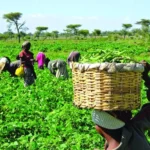The World Price Index of the United Nations Food Agency reached a record two-year low in August, undoing July’s temporary uptick.
The Times reported that the majority of food commodity prices fell, which caused this reversal, while there were price rises for rice and sugar.
The Food and Agriculture Organisation said on Friday that the average value of its price index, which tracks the costs of the most widely traded food items globally, was 121.4 points in August, according to Reuters.
This was a decrease from the previously reported 124.0 points that had been revised for the previous month.
Food costs are increasing globally as a result of Russia’s invasion of Ukraine. The two largest producers of fertilizer and other staples in the world are Russia and Ukraine.
The war is raising the cost of food and fertilizer by disrupting the supply of these commodities.
Nearly 50 countries import wheat from Russia and Ukraine, and 36 of these countries get more than half of their wheat from these two countries, according to a recent World Bank analysis.
Global prices for wheat and maize soared and are now 48 and 28% higher than they were in early February (before the start of the war), as well as 79 and 37% more than they were a year earlier due to (expected) constraints in supply following Russia’s invasion.
Due to the region’s extensive reliance on food imports, the looming global food crisis will have a negative impact on the country and decrease food security, particularly for vulnerable populations.
Already, prices for basic items like rice, wheat, oil, sugar, and processed goods have increased locally in a number of countries in the area by 20% to 50%.
According to the World Food Program, 7 to 10 million more people in West Africa may experience food insecurity as a result of the war’s effects.
Food security forecasts for West Africa and the Sahel region were bleak even before the crisis. For the third year in a row, the region was experiencing a food and nutrition crisis, with 33.4 million people estimated to need food assistance from June to August 2022.
According to his spokesperson, President Bola Tinubu declared an emergency State of Emergency on food insecurity earlier in July to address the rise in food prices.
According to a spokesperson for the president, Dele Alake, President Tinubu is “not unmindful of the rising cost of food and how it affects the citizens.”
The National Bureau of Statistics reports that Nigeria’s annual inflation rate increased to 22.41 percent in May from 22.22 percent the previous month.
Additionally, the inflation rate for food increased from 24.61 percent in April to 24.82 percent in May.
The shock of removing subsidies has been blamed for the increase in food prices, which has also been linked to growing production costs brought on by inflation, insecurity, and restricted access to grain.







